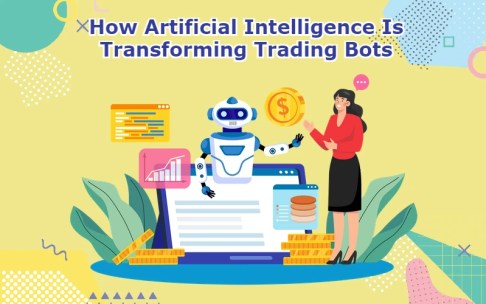The Rise of AI: Trading bots have become integral tools in today’s financial markets, automating the process of buying and selling assets based on predefined criteria. However, the evolution of these bots has been significantly influenced by advancements in artificial intelligence (AI).

This article explores how AI is revolutionizing trading bots, enhancing their capabilities, and transforming the landscape of financial trading. Explore the future of trading with Bitcoin Sprint, where you can connect with experts who are blending AI with market wisdom to revolutionize trading strategies.
Evolution of Trading Bots:
The concept of trading automation dates back to the 1970s when computerized systems were first used to execute trades. These early systems, known as algorithmic trading, relied on simple algorithms to make trading decisions. However, it was not until the 21st century that AI began to play a significant role in the evolution of trading bots.
Advancements in AI technologies, particularly machine learning and neural networks, have enabled trading bots to analyze vast amounts of data and make complex decisions in real time. This has led to a dramatic increase in the speed and accuracy of trading bots, making them more efficient and profitable than ever before.
Role of AI in Trading Bots:
AI has revolutionized trading bots by enabling them to adapt to changing market conditions and make decisions based on complex algorithms. Machine learning, a subset of AI, allows trading bots to learn from past data and improve their performance over time. Neural networks, another AI technology, enable trading bots to recognize patterns in data and make predictions about future market movements.
The use of AI in trading bots has several key benefits. First, AI-powered bots can analyze vast amounts of data much faster than human traders, enabling them to identify profitable trading opportunities that would be missed by humans. Second, AI-powered bots can operate 24/7, allowing them to take advantage of opportunities in global markets. Finally, AI-powered bots are not subject to human emotions, such as fear and greed, which can cloud judgment and lead to poor trading decisions.
AI-Powered Strategies:
AI has enabled the development of sophisticated trading strategies that were previously impossible to implement. For example, AI-powered bots can use machine learning algorithms to identify patterns in market data and make predictions about future price movements. They can also use neural networks to analyze unstructured data, such as news articles and social media posts, to gauge market sentiment and make informed trading decisions.
Some common AI strategies used in trading bots include trend following, mean reversion, and sentiment analysis. Trend-following strategies involve buying assets that are trending upwards and selling assets that are trending downwards. Mean reversion strategies involve buying assets that are undervalued and selling assets that are overvalued.
Sentiment analysis involves analyzing news articles, social media posts, and other sources of information to gauge market sentiment and make trading decisions based on that sentiment.
Impact of AI on Financial Markets:
The rise of AI-powered trading bots has had a profound impact on financial markets. One of the most significant impacts has been on market liquidity. AI-powered bots can execute trades much faster than human traders, leading to increased liquidity and tighter bid-ask spreads. This has made it easier and cheaper for investors to buy and sell assets, improving market efficiency.
However, AI-powered trading bots have also raised concerns about market manipulation and volatility. Because these bots can execute trades automatically based on predefined criteria, there is a risk that they could be used to manipulate prices or create artificial volatility in the market.
Regulators are increasingly concerned about this issue and are exploring ways to mitigate the risks posed by AI-powered trading bots.
Future Trends:
The future of AI in trading bots is likely to be characterized by continued innovation and advancement. Emerging technologies such as deep learning and natural language processing are likely to further enhance the capabilities of trading bots, enabling them to make even more sophisticated trading decisions.
However, the use of AI in trading bots also raises important ethical and regulatory questions. For example, should AI-powered bots be allowed to make trading decisions without human intervention? What safeguards should be put in place to prevent market manipulation and ensure fair and orderly markets? These are questions that regulators and industry participants will need to grapple with in the coming years.
Case Studies:
There have been several high-profile examples of AI-powered trading bots succeeding in the financial markets. For example, Renaissance Technologies, a hedge fund that uses AI-powered trading strategies, has consistently outperformed the market for decades. Similarly, companies like Citadel and Two Sigma have also had success with AI-powered trading strategies.
However, there have also been examples of AI-powered trading bots failing spectacularly. For example, in 2012, Knight Capital lost $440 million in less than an hour due to a glitch in its AI-powered trading system. This incident highlights the risks associated with AI-powered trading bots and the importance of proper risk management and oversight.
Check Also: Digital Yuan: The Future of Money or a Flash in the Pan?
Conclusion:
In conclusion, AI is revolutionizing trading bots, enabling them to make faster, more accurate, and more profitable trading decisions. However, the rise of AI-powered trading bots also raises important ethical and regulatory questions that will need to be addressed in the coming years.
Overall, AI is likely to continue to transform the financial markets, creating new opportunities for investors and regulators alike.
Tags: How artificial intelligence is transforming the world, Artificial intelligence articles for students, How artificial intelligence will change the future essay, The Rise of AI, Best articles on artificial intelligence, Negative impacts of artificial intelligence on society, Why is AI good for society, 5 Importance of artificial intelligence and 10 Benefits of artificial intelligence.
